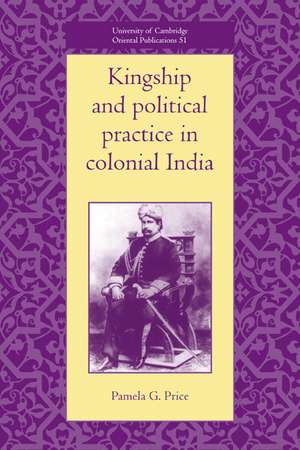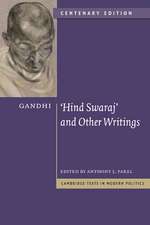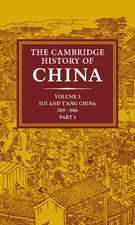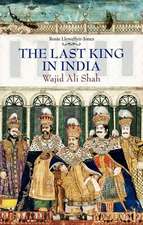Kingship and Political Practice in Colonial India: University of Cambridge Oriental Publications, cartea 51
Autor Pamela G. Priceen Limba Engleză Paperback – 2 dec 2007
| Toate formatele și edițiile | Preț | Express |
|---|---|---|
| Paperback (1) | 284.01 lei 43-57 zile | |
| Cambridge University Press – 2 dec 2007 | 284.01 lei 43-57 zile | |
| Hardback (1) | 693.89 lei 43-57 zile | |
| Cambridge University Press – 13 mar 1996 | 693.89 lei 43-57 zile |
Din seria University of Cambridge Oriental Publications
-
 Preț: 283.79 lei
Preț: 283.79 lei -
 Preț: 287.28 lei
Preț: 287.28 lei -
 Preț: 417.90 lei
Preț: 417.90 lei -
 Preț: 323.27 lei
Preț: 323.27 lei -
 Preț: 398.70 lei
Preț: 398.70 lei -
 Preț: 277.65 lei
Preț: 277.65 lei -
 Preț: 320.17 lei
Preț: 320.17 lei -
 Preț: 442.45 lei
Preț: 442.45 lei -
 Preț: 279.76 lei
Preț: 279.76 lei -
 Preț: 369.69 lei
Preț: 369.69 lei -
 Preț: 302.32 lei
Preț: 302.32 lei -
 Preț: 341.10 lei
Preț: 341.10 lei -
 Preț: 363.42 lei
Preț: 363.42 lei -
 Preț: 345.21 lei
Preț: 345.21 lei -
 Preț: 352.47 lei
Preț: 352.47 lei - 14%
 Preț: 696.53 lei
Preț: 696.53 lei - 14%
 Preț: 1065.54 lei
Preț: 1065.54 lei - 11%
 Preț: 698.50 lei
Preț: 698.50 lei -
 Preț: 244.88 lei
Preț: 244.88 lei - 14%
 Preț: 893.45 lei
Preț: 893.45 lei - 11%
 Preț: 695.74 lei
Preț: 695.74 lei - 11%
 Preț: 699.36 lei
Preț: 699.36 lei - 11%
 Preț: 696.80 lei
Preț: 696.80 lei - 11%
 Preț: 689.09 lei
Preț: 689.09 lei - 14%
 Preț: 760.68 lei
Preț: 760.68 lei -
 Preț: 377.72 lei
Preț: 377.72 lei - 14%
 Preț: 686.73 lei
Preț: 686.73 lei - 11%
 Preț: 694.58 lei
Preț: 694.58 lei - 11%
 Preț: 697.48 lei
Preț: 697.48 lei - 14%
 Preț: 1007.62 lei
Preț: 1007.62 lei - 5%
 Preț: 307.62 lei
Preț: 307.62 lei - 11%
 Preț: 694.38 lei
Preț: 694.38 lei
Preț: 284.01 lei
Nou
Puncte Express: 426
Preț estimativ în valută:
54.35€ • 56.88$ • 45.23£
54.35€ • 56.88$ • 45.23£
Carte tipărită la comandă
Livrare economică 31 martie-14 aprilie
Preluare comenzi: 021 569.72.76
Specificații
ISBN-13: 9780521052290
ISBN-10: 0521052297
Pagini: 244
Ilustrații: 7 b/w illus. 1 map
Dimensiuni: 151 x 229 x 15 mm
Greutate: 0.36 kg
Editura: Cambridge University Press
Colecția Cambridge University Press
Seria University of Cambridge Oriental Publications
Locul publicării:Cambridge, United Kingdom
ISBN-10: 0521052297
Pagini: 244
Ilustrații: 7 b/w illus. 1 map
Dimensiuni: 151 x 229 x 15 mm
Greutate: 0.36 kg
Editura: Cambridge University Press
Colecția Cambridge University Press
Seria University of Cambridge Oriental Publications
Locul publicării:Cambridge, United Kingdom
Cuprins
List of illustrations; Acknowledgements; Glossary; Introduction; 1. Honour, status and state formation in seventeenth- and eighteenth-century Maravar country; 2. Cosmological fragmentation in the public sphere; 3. Domain formation in mid-nineteenth-century Ramnad; 4. Human and divine palaces in the fragmentation of monarchical cosmology; 5. Ritual performances, the ruling person and the public; 6. Raja Baskara Setupati and the emergence of a new political style; Conclusion; Bibliography; Index.
Recenzii
'Kingship and Political Practice in Colonial India is a solid piece of scholarship. Professor Price is at her best when she treats the litigation of the nineteenth century and its effects on the kingdoms of Ramnad and Sivagangai … a useful reminder that present day politics in India (or for that matter much of the rest of the world) have deep roots that go directly back to precolonial times.' Journal of the Royal Asiatic Society
'Overall, her book is compelling and original, and will force scholars to examine afresh the nature of south Indian kingship as it is transformed under British colonial rule.' The Journal of Asian Studies
'The strength of Price's book is to consider honour and ritual not as means to a political end, but as independent ends in themselves … the text is the product of careful research … Using methodological insights from Weberian sociology and steeped in the anthropology of South Asia, Price has produced a cultural history which argues, contra Dirks, for the continuity and evolution of royal symbols and values under colonial rule and in contemporary south India.' Social Anthropology
'Overall, her book is compelling and original, and will force scholars to examine afresh the nature of south Indian kingship as it is transformed under British colonial rule.' The Journal of Asian Studies
'The strength of Price's book is to consider honour and ritual not as means to a political end, but as independent ends in themselves … the text is the product of careful research … Using methodological insights from Weberian sociology and steeped in the anthropology of South Asia, Price has produced a cultural history which argues, contra Dirks, for the continuity and evolution of royal symbols and values under colonial rule and in contemporary south India.' Social Anthropology
Descriere
This 2006 book considers the transformation of southern Indian institutions under British colonial rule, focusing on the two former 'little kingdoms' of Ramnad and Sivaganga.












